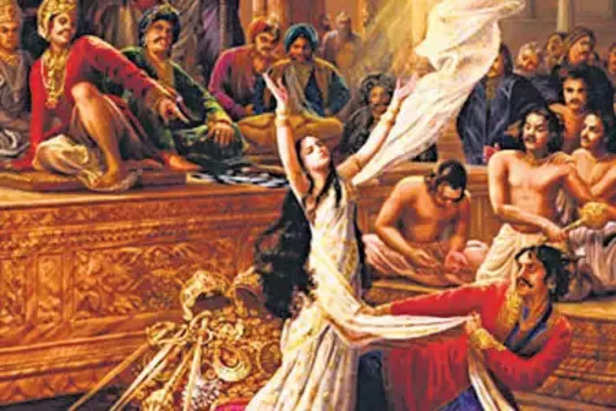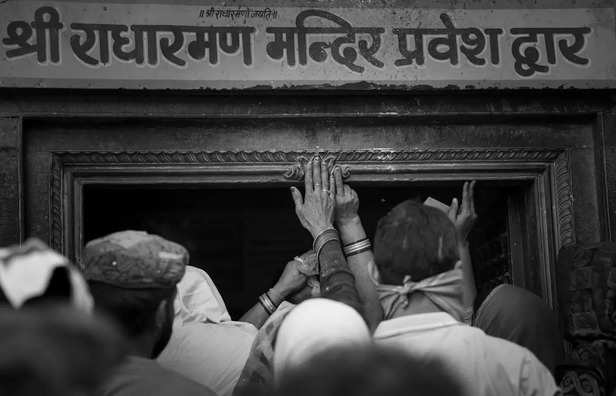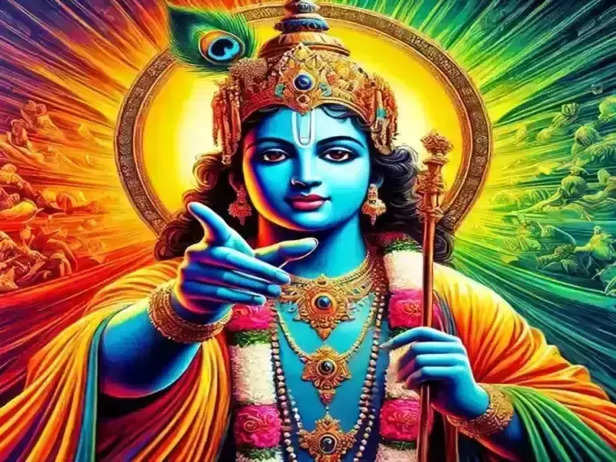The Gods We Worship Would Reject Us – The Gita on Today’s Moral Crisis
Nidhi | Apr 01, 2025, 12:26 IST

( Image credit : Times Life Bureau )
In a world where we worship gods but often ignore their teachings, this article invites us to reflect on the moral crisis we face today. Drawing insights from the Bhagavad Gita, it explores how we’ve strayed from the principles of righteousness (dharma) and mindful actions (karma), even as we claim devotion. It’s a thought-provoking look at how our actions don’t always align with our beliefs, leaving us to wonder: if the gods we worship were to observe us today, would they accept us or reject us?
We live in an era where temples are crowded, rituals are performed with precision, and festivals are celebrated with grandeur. Yet, the same society that bows before deities remains blind to their teachings. Crimes surge, morality erodes, and ethical boundaries dissolve—leaving us to wonder: have we mistaken devotion for mere symbolism?
Despite technological progress, the world is not evolving into a more ethical space. In India alone, the National Crime Records Bureau (NCRB) reported over 4.28 lakh cases of crimes against women in 2022—an alarming rise from previous years. Corruption thrives, injustice is normalized, and greed dictates actions. Have we truly progressed, or have we entered a modern Kaliyug, where darkness cloaks itself in the illusion of civilization? The Bhagavad Gita offers a striking perspective: True devotion is not in prayers alone but in living by Dharma—the righteousness that sustains society.
"धर्मेण हीनः पशुभिः समानः।" (Without Dharma, humans are no different from animals.)

We ask the gods for safety but build a world of danger. Women fear walking alone at night, children are exploited, and trust has become a luxury. The Gita teaches that a society that forsakes dharma—righteous duty—breeds disorder. Krishna's words to Arjuna remind us that true security comes not from external forces but from the collective morality of a people. If crime rises while devotion intensifies, we must ask—what is missing from our faith?
"यद्यदाचरति श्रेष्ठस्तत्तदेवेतरो जनः।" (Bhagavad Gita 3.21)

Rituals are practiced meticulously, but kindness and honesty are abandoned. The Gita emphasizes that true devotion is reflected in actions, not in mechanical worship. We teach our children to fold hands before an idol but fail to teach them to respect others. If religion is to be meaningful, it must be lived—otherwise, it remains a hollow tradition, devoid of transformation.
"अहिंसा परमो धर्मः।" (Non-violence is the highest duty.)

From war to communal hatred, from domestic abuse to systemic oppression—violence pervades society. The same lips that chant Krishna’s name spit venom in his devotees' names. The Bhagavad Gita calls for courage, but not cruelty; justice, but not vengeance. When did faith become an excuse for hostility rather than a path to peace?
"कर्मण्येवाधिकारस्ते मा फलेषु कदाचन।" (Bhagavad Gita 2.47)

We invoke karma when it suits us but dismiss it when accountability comes knocking. Corrupt leaders amass wealth, believing their power shields them. But the Gita warns—karma never forgets. Justice may seem delayed, but consequences are inevitable. Every action leaves an imprint, shaping not only our lives but the destiny of an entire civilization.
"अधर्मो धर्म इत्याहुः धर्मं चाधर्म एव च।" (Bhagavad Gita 16.7)

Morality is now subjective—cheating is called intelligence, deceit is strategy, and exploitation is ambition. The Bhagavad Gita cautions against a world where adharma (unrighteousness) is disguised as righteousness. A society that blurs the line between right and wrong does not progress; it collapses.
"परित्राणाय साधूनां विनाशाय च दुष्कृताम्।" (Bhagavad Gita 4.8)

People demand change but refuse to change themselves. The Gita teaches that righteousness is not upheld by divine intervention alone—it thrives through human effort. Krishna did not fight the Mahabharata war; Arjuna did. Likewise, if we seek a just world, we must be willing to act—not just pray for miracles.
"सर्वधर्मान्परित्यज्य मामेकं शरणं व्रज।" (Bhagavad Gita 18.66)
Kaliyug is not just an age—it is a mindset. A mindset where faith is superficial, where prayers are routine, and where devotion is selective. Krishna’s ultimate teaching was surrender—not of intellect, but of ego; not of questioning, but of blind hypocrisy. True spirituality is not in external displays but in internal transformation.
The Bhagavad Gita does not demand blind faith; it demands conscious living. It asks us to reflect—are we truly devoted, or do we merely seek divine approval for our flawed ways?
If faith does not make us better humans, is it faith at all? If devotion does not reflect in our actions, are we truly devoted?
The choice is ours: Will we continue to worship gods while ignoring their words, or will we embody their teachings and restore the lost dharma of our society? The answer determines whether we progress—or continue spiraling into the darkness of a self-created Kaliyug.
Despite technological progress, the world is not evolving into a more ethical space. In India alone, the National Crime Records Bureau (NCRB) reported over 4.28 lakh cases of crimes against women in 2022—an alarming rise from previous years. Corruption thrives, injustice is normalized, and greed dictates actions. Have we truly progressed, or have we entered a modern Kaliyug, where darkness cloaks itself in the illusion of civilization? The Bhagavad Gita offers a striking perspective: True devotion is not in prayers alone but in living by Dharma—the righteousness that sustains society.
1. We Pray for Protection, Yet Create a Society of Fear

Draupadi
( Image credit : Times Life Bureau )
We ask the gods for safety but build a world of danger. Women fear walking alone at night, children are exploited, and trust has become a luxury. The Gita teaches that a society that forsakes dharma—righteous duty—breeds disorder. Krishna's words to Arjuna remind us that true security comes not from external forces but from the collective morality of a people. If crime rises while devotion intensifies, we must ask—what is missing from our faith?
2. Temples Are Full, Yet Hearts Are Empty

Vrindavan, Uttar Pradesh
( Image credit : Pexels )
Rituals are practiced meticulously, but kindness and honesty are abandoned. The Gita emphasizes that true devotion is reflected in actions, not in mechanical worship. We teach our children to fold hands before an idol but fail to teach them to respect others. If religion is to be meaningful, it must be lived—otherwise, it remains a hollow tradition, devoid of transformation.
3. We Preach Non-Violence, Yet Blood Stains Our Streets

Violence in India
( Image credit : Times Life Bureau )
From war to communal hatred, from domestic abuse to systemic oppression—violence pervades society. The same lips that chant Krishna’s name spit venom in his devotees' names. The Bhagavad Gita calls for courage, but not cruelty; justice, but not vengeance. When did faith become an excuse for hostility rather than a path to peace?
4. We Seek Karma’s Rewards but Ignore Its Consequences

Justice
( Image credit : Pexels )
We invoke karma when it suits us but dismiss it when accountability comes knocking. Corrupt leaders amass wealth, believing their power shields them. But the Gita warns—karma never forgets. Justice may seem delayed, but consequences are inevitable. Every action leaves an imprint, shaping not only our lives but the destiny of an entire civilization.
5. We Justify Wrongdoings in the Name of Progress

Corruption
( Image credit : Times Life Bureau )
Morality is now subjective—cheating is called intelligence, deceit is strategy, and exploitation is ambition. The Bhagavad Gita cautions against a world where adharma (unrighteousness) is disguised as righteousness. A society that blurs the line between right and wrong does not progress; it collapses.
6. We Want a Just World but Won’t Take Responsibility

Bring Change in Society
( Image credit : Times Life Bureau )
People demand change but refuse to change themselves. The Gita teaches that righteousness is not upheld by divine intervention alone—it thrives through human effort. Krishna did not fight the Mahabharata war; Arjuna did. Likewise, if we seek a just world, we must be willing to act—not just pray for miracles.
7. The Kaliyug of Our Minds: Worship Without Wisdom
Kaliyug is not just an age—it is a mindset. A mindset where faith is superficial, where prayers are routine, and where devotion is selective. Krishna’s ultimate teaching was surrender—not of intellect, but of ego; not of questioning, but of blind hypocrisy. True spirituality is not in external displays but in internal transformation.
Will We Choose Devotion or Deception?
If faith does not make us better humans, is it faith at all? If devotion does not reflect in our actions, are we truly devoted?
The choice is ours: Will we continue to worship gods while ignoring their words, or will we embody their teachings and restore the lost dharma of our society? The answer determines whether we progress—or continue spiraling into the darkness of a self-created Kaliyug.
